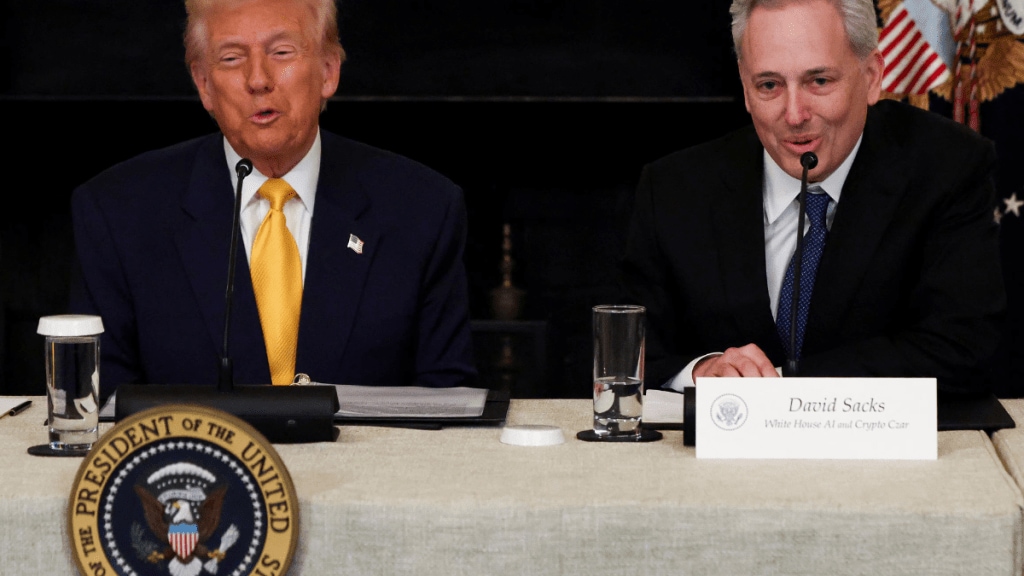US President Donald Trump made a historic move on Friday by hosting a first-of-its-kind cryptocurrency summit at the White House. The high-profile gathering brought together industry leaders, lawmakers, and administration officials to discuss Trump’s plans for a government-owned digital asset reserve.
The event, held in the White House’s State Dining Room, featured prominent figures such as MicroStrategy CEO Michael Saylor, Coinbase co-founder and CEO Brian Armstrong, investors Cameron and Tyler Winklevoss, and entrepreneur David Bailey. Also in attendance was Zach Witkoff, one of the founders of Trump’s own crypto business, World Liberty Financial.
Government-Owned Bitcoin Reserve
A key focus of the summit was Trump’s executive order, signed on Thursday, establishing a strategic bitcoin reserve. The order directs the Treasury and Commerce Departments to develop “budget-neutral strategies” for acquiring additional bitcoin without imposing any costs on taxpayers. Trump emphasized this commitment during the summit, stating, “We don’t want any cost to the taxpayers.”
White House crypto czar David Sacks explained that the reserve would be built using bitcoin already owned by the federal government, primarily assets forfeited through criminal and civil asset seizures. Sacks also noted that taxpayer funds would not be used to purchase new digital assets and that consumer protections remain in place.
Market Reaction and Industry Concerns
The announcement led to a 3.4% decline in bitcoin prices, with the cryptocurrency dropping to $86,394. Market participants had anticipated a more aggressive acquisition plan, and some were disappointed by the decision not to allocate new funds for purchasing digital assets.
JP Richardson, co-founder and CEO of Exodus, voiced concerns about Trump’s proposal to include additional cryptocurrencies in the reserve. While he holds some of the digital assets Trump suggested adding, he warned that smaller and more volatile coins could introduce unnecessary risk. “Crypto has made big strides, but it’s still a relatively nascent industry,” Richardson said.
Collaboration with Industry Leaders
The summit was widely regarded as a turning point in government-crypto relations. Many industry leaders, who previously felt under regulatory scrutiny, praised the administration’s new approach.
“For the first time, industry leaders feel they’re walking into a collaborative discussion,” said Les Borsai, co-founder of Wave Digital Assets, though he noted he was not invited to the event.
Trump struck an optimistic tone about the future of cryptocurrency in the U.S., declaring, “We feel like pioneers in a way.” He also referenced the well-known bitcoin mantra, “Never sell your bitcoin,” reinforcing his executive order’s directive that government-held bitcoin should not be sold.
Regulatory Clarity and Future Outlook
Attendees expressed hope that the summit signaled a shift toward clearer regulations. Yesha Yadav, associate dean and professor of law at Vanderbilt University, emphasized the need for certainty around regulatory oversight. “What everyone really needs to have at this point is clarity on what the level of scrutiny and intensity of regulation will be, who the key regulators will be,” she said.
The summit also underscored the broader vision for cryptocurrency’s role in the U.S. economy. Treasury Secretary Scott Bessent reaffirmed that while the U.S. dollar would remain the world’s reserve currency, stablecoins would play a role in maintaining its dominance.
Conflict-of-Interest Concerns
Despite the positive reception from industry leaders, Trump’s deep ties to cryptocurrency have raised ethical concerns. He holds a stake in World Liberty Financial and has launched meme coins through his family’s ventures. While his aides maintain that Trump has relinquished control of his business interests, ethics lawyers are currently reviewing the matter.
The White House has not responded to inquiries regarding potential conflicts of interest.
Conclusion
Trump’s crypto summit marks a significant shift in the U.S. government’s approach to digital assets. While the move has been welcomed by many in the industry, concerns remain about the specifics of the strategic reserve and the regulatory framework. As discussions progress, the cryptocurrency sector will be closely watching how the administration navigates this evolving landscape.
